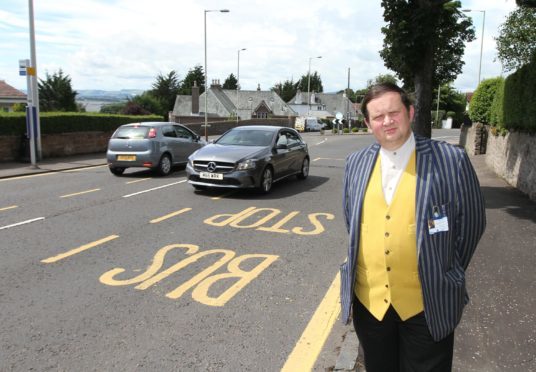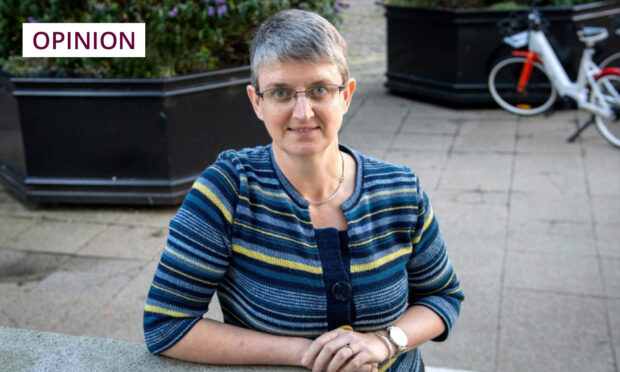Sir, – I am following two contrasting stories which highlight vested interests and the democratic deficit. Let me explain. Firstly, the West End traders’ frustration at the delay in getting their “branding identity” ready for the V&A opening (“West End community group leader hits out over ‘brand’ setbacks”, The Courier, February 5).
I like the West End, the streets are clean and the shops are always bustling with customers. The retailers are lucky they are well looked after by the council and their representatives are obviously well networked.
Contrast that with another story, the discarded litter in Lochee High Street (“‘Wake up call’ as work uncovers huge haul of litter on side of road”, The Courier, February 5.
None of the West End’s advantages apply to Lochee. Why?
Lochee has been allowed to die in plain sight, the non-collection of visible rubbish is one example. People’s self-respect has been trampled on by neglect.
Why was Lochee’s decline allowed to happen? I see evidence that the powers that be are embarrassed by Lochee, and everything it stood for.
For the record, Lochee people were the best examples of a working class community ever seen in this city. The men and women epitomised everything a community should be, but then betrayal and neglect took its toll.
Why should we allow two Dundees to co-exist? The vibrant, modern Dundee with technology and learning powering away, contrasted with Lochee, which can’t even support two chemist shops in the High Street.
The West End want a brand and Lochee people want their community back. Where should the efforts and resources be directed ?
I am a keen supporter of the V&A, it will transform the city, no doubt, but how will the economic, social and cultural benefits drag Lochee out of its death spiral?
I want to hear a more credible answer than the trickle-down economic theory, and buzzwords like ‘strategy’, ‘timescale’ and ‘outcomes’. This is more important than economic theory – kids’ futures depend on it.
I’m sure the West End traders will do just fine without the need for more gentrification.Lochee is waiting!
Michael Garty.
43 Constitution Street,
Dundee.
Paying for bins? Then buy this
Sir, – With regard to Perth Council’s proposed £25 charge for a permit for uplifting the brown bin with garden waste, as against uplifting a bin for nothing without garden waste (“Proposals for brown bin charges rubbished”, The Courier, February 5).
I put it this way:
Dear Mr Recycling High Heid Yin, Ivory Tower, Perth Cooncil. –
Please find below my account for services rendered in doing recycling work for you.
Two minutes per day for one year in advance – 12 hours and 17 minutes @ minimum wage of £7.50 (soon to rise) = £91.25. Less your charge of £25 which you are kindly proposing to impose while we do the garden waste recycling for you = £66.25.
Please transfer this amount by BACS system, as writing a cheque would ultimately have to be recycled by the bank, and the added expense would be passed back to me.
PS: At a later date, I may include a fuel charge for delivering bottles to the recycling depot for you.
Peter Cargill.
8 South Inch Park,
Perth.
Simple link to better living
Sir, – The latest statistics from the Bank of Scotland show Edinburgh to be the least-affordable city in Scotland with a current average house price of £245,349 and mean household income of £41,450.
Dundee fares only slightly better, with house prices worth 5.5 times annual household earnings, compared with six times for the capital.
Both these cities should be within one hour’s journey time of Levenmouth, where average house prices are only 40% of Edinburgh’s and earnings are much lower.
What an opportunity exists to address this widening imbalance and inequality by installing fast public transport –rail links – allowing easy commuting for large numbers.
Incomes, house prices and the local economy in lagging mid-Fife would rise.
Folks struggling in Edinburgh could find a cheaper home here, while people from Levenmouth could much more easily work or study in Edinburgh.
Everyone would benefit from minimal investment.
Surely this must be a matter of urgency for the Scottish Government to address?
James Robertson.
Casan,
Leven,
Fife.
Make foreign students pay
Sir, – For many years Scottish taxpayers, to the tune of hundreds of millions of pounds, have subsidised foreign students by paying their tuition fees, due to European rules.
One would have thought that coming out of the European Union would free the Scottish Government of this obligation. But no.
The SNP government, after raising taxes from hard-working Scottish workers, will continue to use these taxes to pay foreign students’ fees, even after the obligation ceases.
In fact, if the Scottish government wanted, it could charge these foreign students, as it does with students from England, Wales and Ireland.
Michael Rogalski.
82 Feus Rd,
Perth.
The power grab for Scotland
Sir, – During the Scottish independence referendum in 2014 the people of Scotland were promised one of the most powerful devolved parliaments in the world.
In March 2017 Scottish Secretary David Mundell gave “an absolute guarantee that after the UK leaves the EU, the Scottish Parliament and Scottish ministers will have more powers than they have today”.
But he didnt specifically say that all the powers presently devolved would be returned.
And, as the Brexit saga unfolds, it is becoming clear that devolved government is actually incompatible with Brexit, certainly as the hardline Brexiteers would wish to implement it. For example, healthcare is devolved, so, any future trade deal, perhaps with the US, which might involve access to NHS contracts for US companies, could, or almost certainly would, be voted down by the devolved administrations.
Agriculture and fisheries are devolved so any trade deals affecting these areas, for example trading fishing rights for something more important to Westminster, could also be vetoed.
So, in effect, the UK Government does not have the powers it needs to negotiate the trade deals it wishes, unless it takes powers back from the devolved administrations.
All of this, I would suggest, explains why the UK Government are so determined that the devolved powers returning from Europe be taken back to Westminster first, where they will no doubt retain the ones they need, and return only the ones they don’t.
I understand also that the Scottish Office, the UK Government in Scotland, headed up by David Mundell, has taken on more office space in Edinburgh, and large numbers of new staff, which prompts the suspicion that the devolved powers which Westminster needs to retain will indeed return to Scotland – but to the Scottish Office, not to the Scottish Government.
That way they will, nominally, be in Scotland but, in actual fact, will be under the control of Westminster.
Ultimately, I would suggest that if Brexit goes as the hard-line Brexit cabal plans it, then the continued existence of the Scottish Parliament, in any meaningful way, will be under threat.
But, as Enoch Powell said, and we all know, “power devolved is power retained”.
Les Mackay.
5 Carmichael Gardens,
Dundee.










